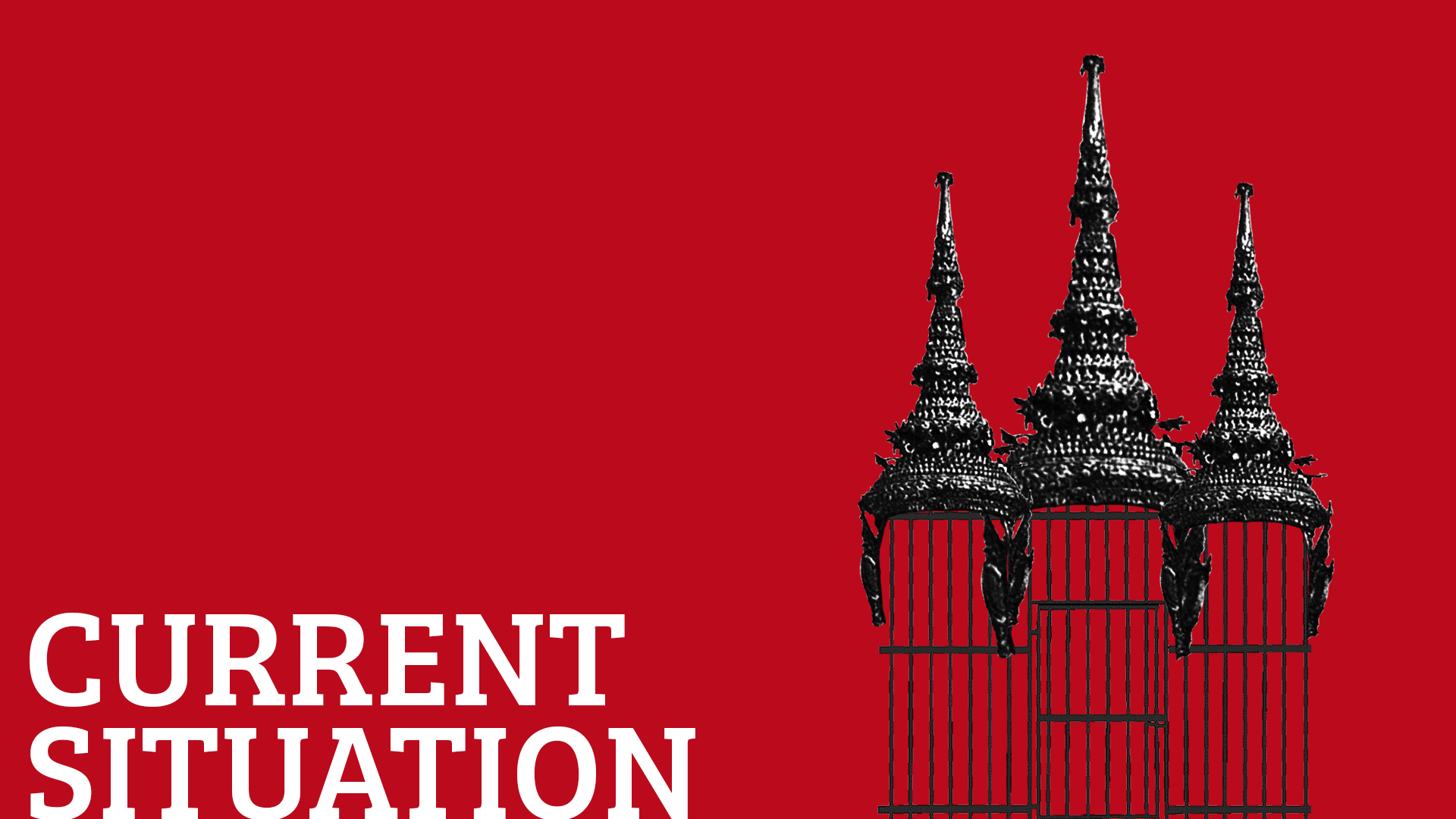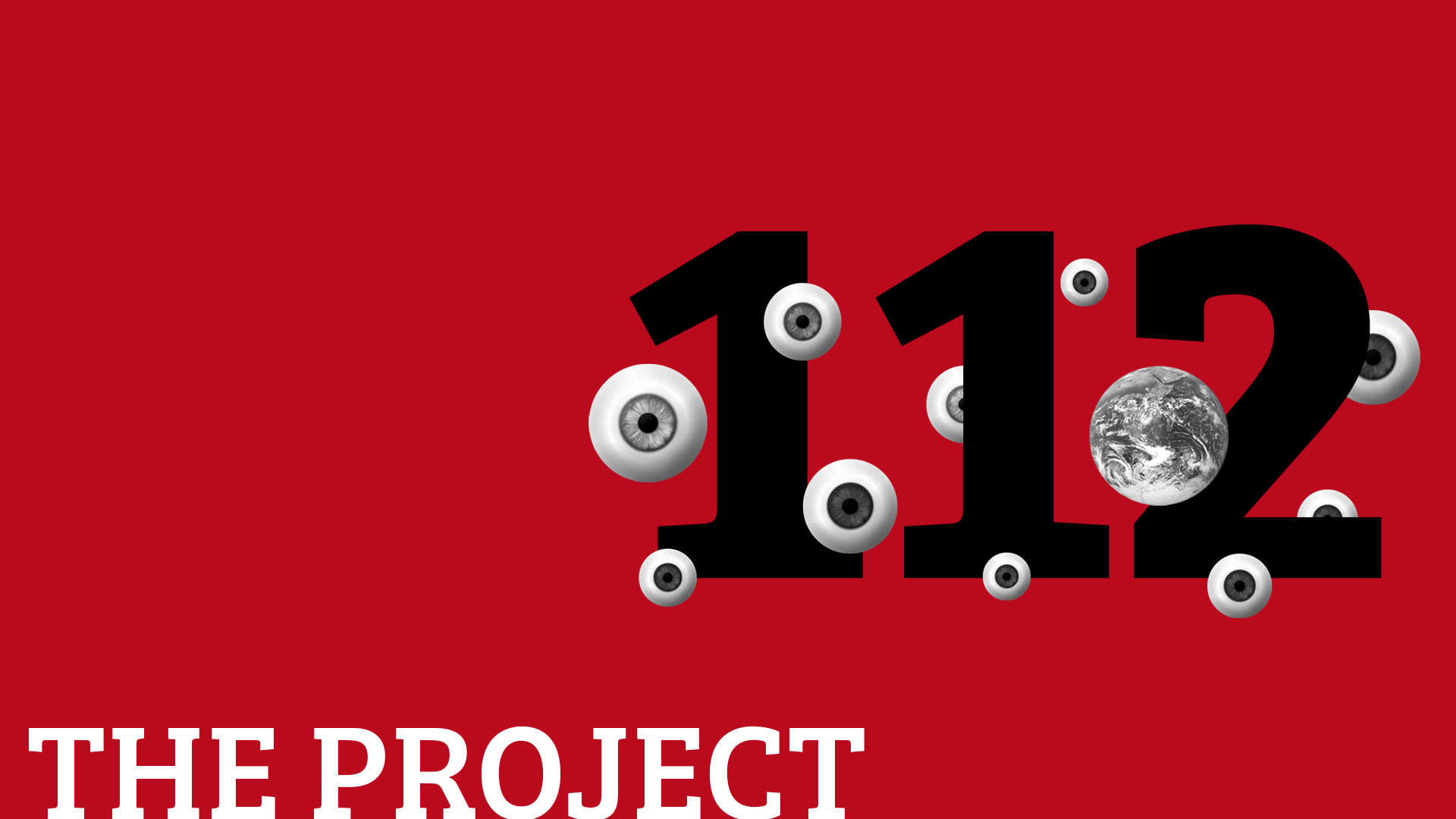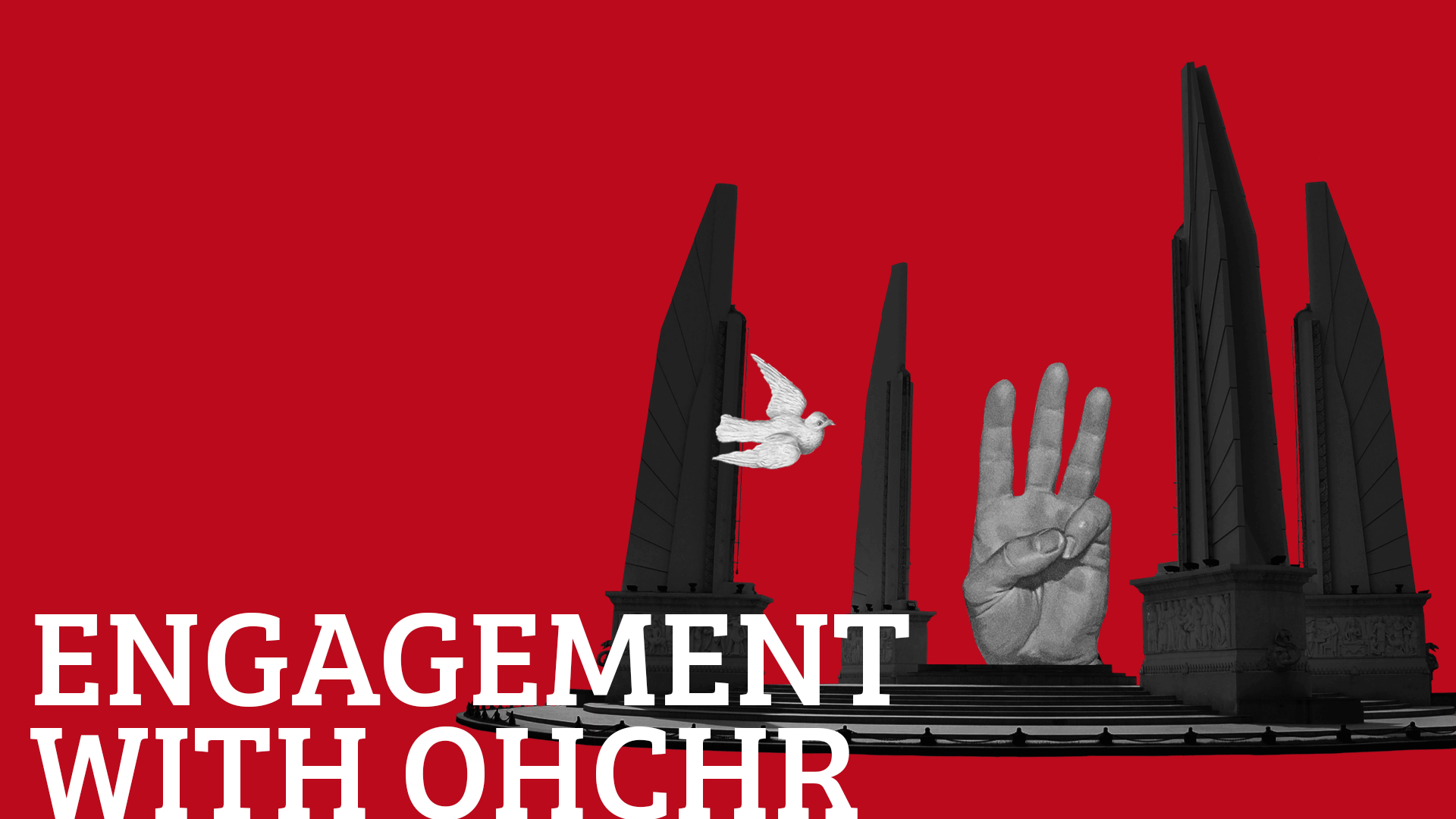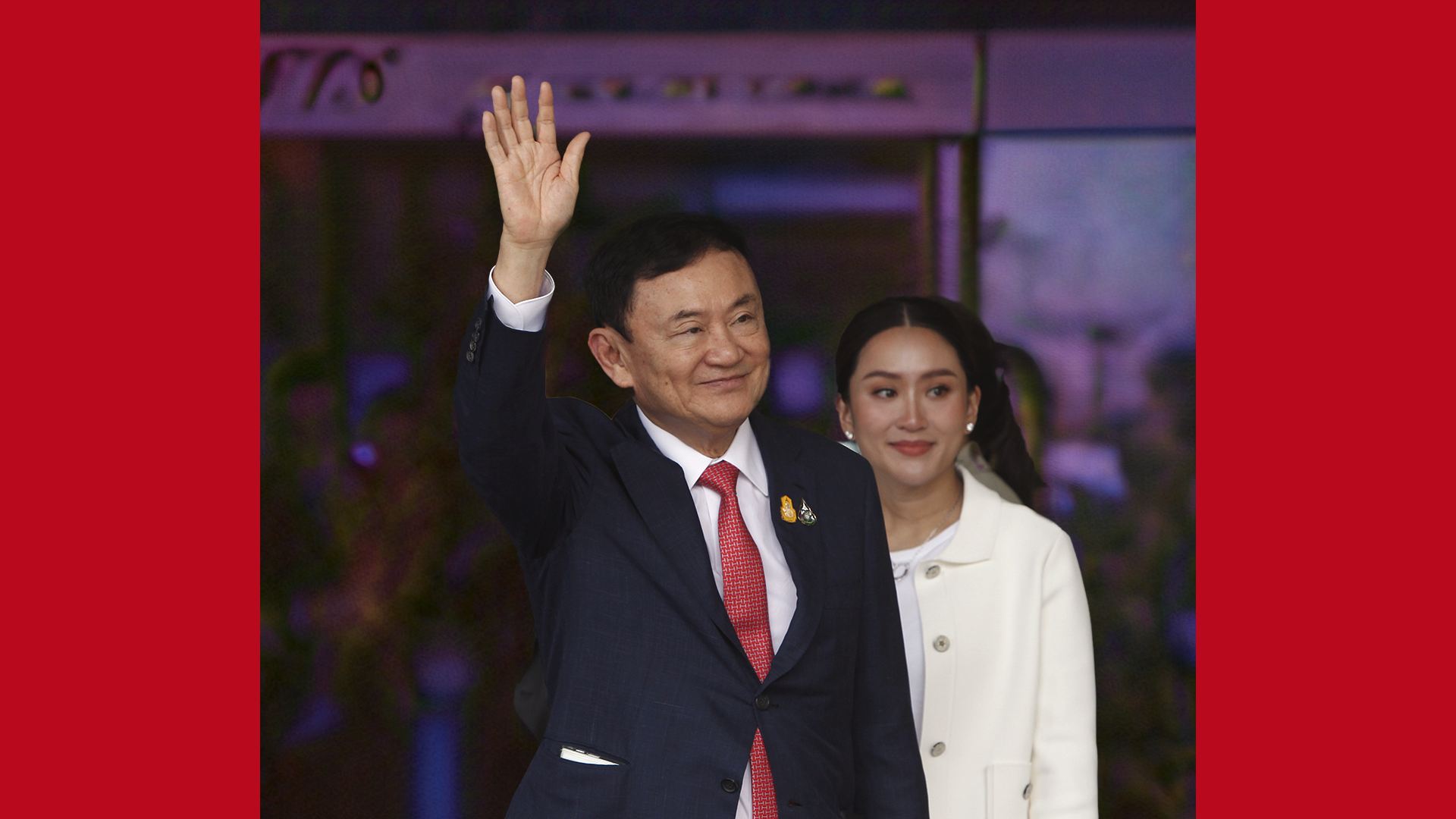
Former Thai Prime Minister Thaksin Shinawatra waves to his supporters after his return to Thailand at the private jet terminal at Don Mueang airport in Bangkok August 22, 2023. Photo: Chaiwat Subprasom, Shutterstock
Thaksin: From Populist to Strongman?
As Thailand stands at this critical juncture, the actions of all political actors, but particularly Thaksin Shinawatra and the People's Party, will shape the country's democratic future for years to come.
August 28, 2024
Is Thaksin Shinawatra emerging as a strongman who, through his alliance with military-backed parties, has signalled a betrayal of democratic reform, particularly regarding the controversial Section 112 Lèse-majesté law, in an effort to bar the People's Party from power? This question strikes at the heart of Thailand's current political tumult, forcing us to reconsider the motivations and potential consequences of Thaksin's dramatic return to the Thai political scene.
From Populist to Power Broker
Thaksin Shinawatra's homecoming after more than 15 years in exile has sent shockwaves through Thailand's political landscape. His return coincides with his Pheu Thai Party's ascension to government through a controversial alliance with military-backed parties, marking a significant shift in the country's political dynamics. This development raises critical questions about the future of democratic reform in Thailand, particularly concerning the highly sensitive issue of Lèse-majesté law reform and the role of the People's Party as the new face of progressive politics in the country.
To understand the gravity of this situation, we must first examine Thaksin's political history and the context of his return. Thaksin first rose to power in 2001 on a wave of populist policies that garnered strong support from rural and working-class voters. His programs, including universal healthcare and village-level microcredit schemes, earned him a devoted following among many Thais. However, his tenure was also marked by allegations of corruption, human rights abuses, and attempts to consolidate power, leading to his ouster in a military coup in 2006.
Since then, Thai politics has been defined by a struggle between pro-Thaksin forces and the traditional elite, including the military and royalist establishment. This conflict has resulted in multiple coups, constitutional changes, and periods of political instability. Throughout this time, Thaksin remained a polarising figure, seen by some as a champion of the poor and by others as a threat to Thailand's traditional power structures.
The People's Party: The Last Bastion of Democratic Reform?
The emergence of the Future Forward Party in 2018, which later became the Move Forward Party and is now known as the People's Party (Prachachon), introduced a new progressive force in Thai politics. This party's agenda, which includes reform of the military and the monarchy, resonated strongly with young and urban Thais. Their stance on reforming Section 112, the Lèse-majesté law, became a central pillar of their platform and a key factor in their electoral success.

The Law That Could Break Thailand's Democracy
Section 112 of Thailand's Criminal Code, commonly known as the Lèse-majesté law, has long been a contentious issue in Thai politics. The law, which criminalises criticism of the monarchy with severe penalties of up to 15 years imprisonment per offense, has been widely criticsed by human rights organisations and pro-democracy activists as a tool for suppressing dissent and limiting free speech. The People's Party's commitment to reforming this law was a significant factor in their winning the most seats in the 2023 election, but it also became the primary obstacle preventing them from forming a government due to opposition from conservative forces.
Thaksin's return under these circumstances, and his party's alliance with military-backed parties, raises troubling questions about his current political stance, especially regarding the Lèse-majesté law. Has Thaksin, once seen as a challenger to Thailand's traditional power structures, now aligned himself with these very forces to secure his return to influence? More importantly, is this alliance aimed at maintaining the status quo on Section 112, effectively barring the People's Party and its reform agenda from power?
The notion of Thaksin as a "strongman" in this context is particularly concerning. Historically, Thaksin's leadership style has been characterised as authoritarian by his critics, who accused him of consolidating power and undermining democratic institutions during his time as Prime Minister. His return, coupled with the formation of a government that spans the traditional political divide, could be seen as an attempt to reassert his dominance over Thai politics, this time with the backing of his former adversaries in the military and royalist establishment.
This potential transformation from populist leader to authoritarian figure aligning with conservative forces represents a significant shift in Thai politics. It suggests a possible backsliding on democratic progress, with the issue of Lèse-majesté reform likely to be sidelined or even actively opposed by this new coalition. This development is particularly disheartening for those who saw Thaksin and Pheu Thai as potential allies in the push for greater democratic freedoms.
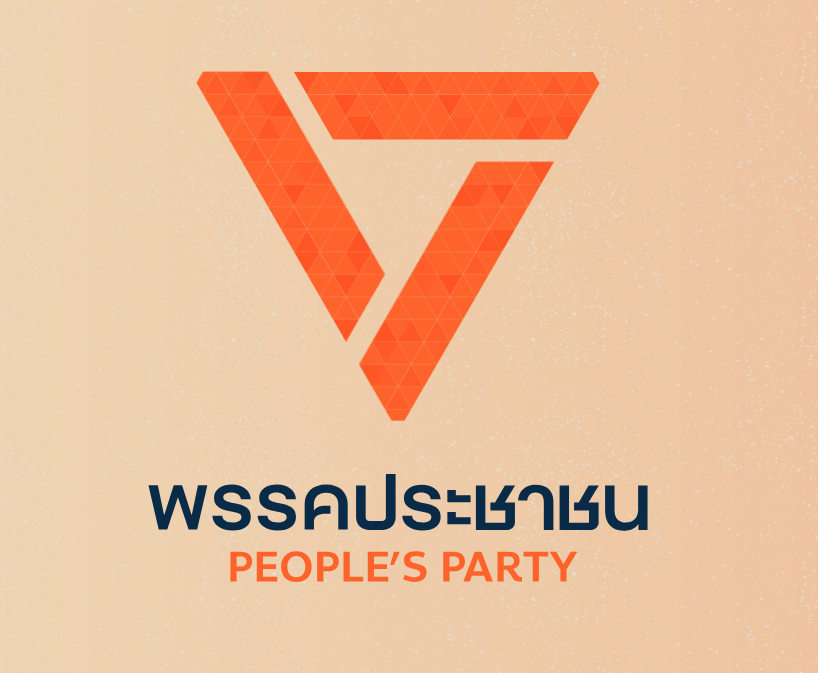
The People's Party's Uphill Battle: Can They Overcome Thaksin's Shadow?
The alliance between Pheu Thai and military-backed parties presents a formidable challenge for the People's Party and the broader reform movement. It creates a powerful bloc that could effectively sideline the People's Party's agenda, particularly on sensitive issues like Section 112 reform. This situation is reminiscent of other countries where populist leaders have made compromises with establishment forces to maintain power, often at the expense of progressive reforms. For instance, in Pakistan, we've seen political dynasties alternating power with military rule, often making deals that prioritise stability and personal power over democratic reforms. In Italy, Silvio Berlusconi's multiple returns to power despite legal troubles and scandals were often facilitated by alliances with various political factions, sometimes at the cost of his professed reformist agenda.
The key question now is how the People's Party can combat this new political reality and continue to push for democratic reforms, particularly regarding Section 112. Their strategy must be multifaceted and persistent. The People's Party must double down on their commitment to reforming the Lèse-majesté law, keeping this issue at the forefront of national discourse. By doing so, they can continue to differentiate themselves from the compromised position of Pheu Thai and appeal to voters who are disillusioned with the apparent abandonment of reform principles.
Furthermore, the People's Party should work to highlight the inconsistencies in Thaksin's newfound alliance with military-backed parties. They could argue that this alliance represents a betrayal of the democratic ideals that Thaksin once claimed to champion, particularly regarding free speech and political reform. Building on their success in mobilising young and urban voters, the People's Party should expand their grassroots organising efforts, particularly in rural areas that have traditionally been Pheu Thai strongholds. This could involve education campaigns about the importance of Lèse-majesté reform and its connection to broader democratic freedoms.
Thailand's Democratic Future on the Line
As the main opposition party, the People's Party can use its position in parliament to continually raise the issue of Lèse-majesté reform, proposing legislation and forcing debates that keep the topic in the public eye. They could also seek to build international support for their stance on Lèse-majesté reform, highlighting how the law is used to suppress dissent and violate human rights. This international pressure could make it more difficult for the Pheu Thai-led government to maintain the status quo on Section 112 without facing significant criticism.
The People's Party should work to build a broad coalition of civil society organisations, academics, and other political actors who support reform of Section 112, creating a united front against the law's continued use to stifle free speech and political dissent. Developing a robust media strategy to counter potential propaganda from the government alliance will be crucial. This could involve leveraging social media, independent news outlets, and international media to keep the issue of Lèse-majesté reform in the public consciousness.
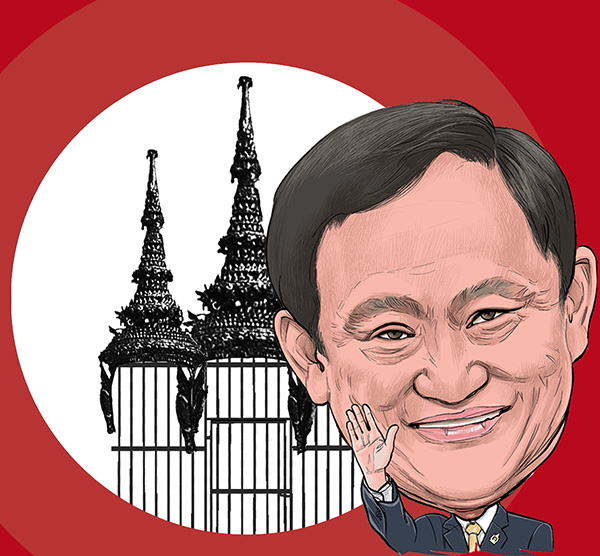
Thaksin's True Colours and the Fight for Thailand's Future
The coming months and years will be crucial in determining whether Thailand can move towards greater democratic consolidation or whether it will remain trapped in cycles of political instability and authoritarian control. The fate of Section 112 and the broader issue of monarchy reform will be a key indicator of the country's direction. If Thaksin and the Pheu Thai-led government choose to maintain the status quo on Lèse-majesté, it could signal a significant setback for the reform movement and a consolidation of conservative power. This would not only disappoint many of Thaksin's former supporters but also potentially alienate a large portion of the population that voted for change in the last election.
However, the situation also presents an opportunity for the People's Party to establish itself as the true voice of democratic reform in Thailand. By maintaining their principles and effectively opposing the new government's stance on Section 112, they can position themselves as the champions of progress and potentially win over disillusioned supporters of Pheu Thai. The international community will be watching closely, and Thailand's handling of the Lèse-majesté issue will have significant implications not just for the country's own democratic development, but for human rights and freedom of expression in Southeast Asia as a whole. The struggle over Section 112 is more than just a domestic political issue; it represents a broader conflict between authoritarian tendencies and democratic aspirations that resonates across the region.
Therefore, the question of whether Thaksin Shinawatra has become a strongman figure aligning with conservative forces to bar the People's Party through the maintenance of the Lèse-majesté law is a complex one. It reflects the intricate and often contradictory nature of Thai politics, where alliances shift, and ideologies bend in the pursuit of power. The People's Party faces a significant challenge in navigating this new political landscape, but their commitment to reforming Section 112 and broader democratic principles provides them with a clear path forward. The ultimate outcome of this political struggle will depend on various factors, including the resilience of Thailand's civil society, the continued engagement of the country's youth in political processes, and the ability of the People's Party to maintain pressure on the government while expanding their support base. As Thailand stands at this critical juncture, the actions of all political actors, but particularly Thaksin Shinawatra and the People's Party, will shape the country's democratic future for years to come.
Prem Singh Gill
Prem Singh Gill is a Visiting Scholar at the Universitas Muhammadiyah Yogyakarta, Indonesia and a Visiting Scholar in Thammasat University

